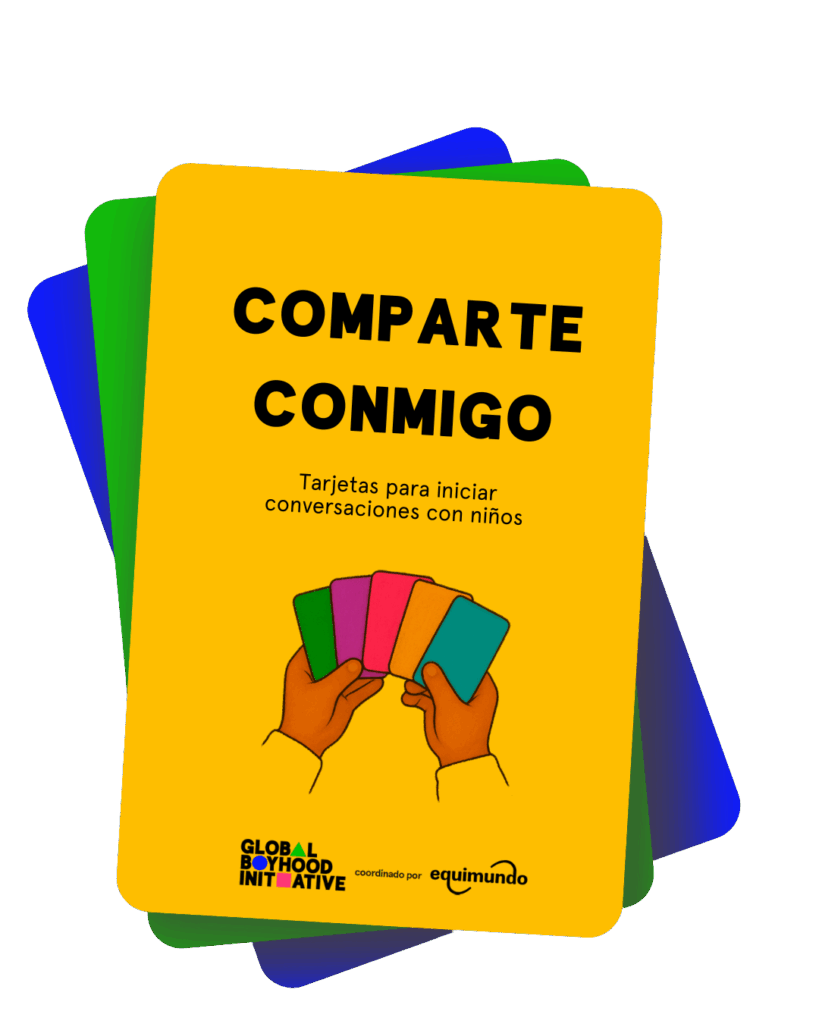Share me with me:
Do you feel that you don’t know how to start conversations with your kids?
Do you feel that as they grow up, they distance themselves from you?
Do you have a desire to build more trust with them and understand their online lives?
We are finding more and more that parents want to establish caring relationships with their kids, but often, they lack the tools and know-how. This is why we created “Share with me” conversations starters.

How did we create them?
Through three cycles of user testing with families and children in Bolivia, Colombia, Ecuador, Mexico, Paraguay, and Peru we sought to understand the needs of families and their existing interactions with their sons. We also sought to identify sons’ reactions to these tools and the best engagement strategies for each age group (4-6, 7-9, and 10-13), that will open up conversations between them and their families.
What did we find?
Families want to engage and know their sons better, but are not sure how to do this in a changing and increasingly digitalized world. Though many do not have a lot of time, especially after long working hours and little caregiving support, they identify short everyday moments as opportunities in which they can speak with their sons, such as having breakfast, going or picking them up from school, diner time, bed time, and even bath time. Connecting during these everyday moments can be essential in building closer and stronger relationships with their sons. This is why the cards have been designed to be used even if you have only 5 minutes. They can also be accessed online (on phones or tablets) and for those that prefer to have something physical, a simpler version can also be printed.
Designing for the developmental needs and capacities of the different age groups:
We found that boys between 4 and 13 years all have different needs, vocabularies, and preferred ways to engage in conversations:
Ages 4 to 6: Boys engage more with games, using direct and simple language. While their socio-emotional vocabulary is expanding, their responses are often corporal and respond best to the use of images that they can relate to.
Ages 7 to 9: Boys are able to communicate more emotions and experiences and interact well with games, some structure and examples that they can relate to. They often respond with questions so be prepared to share your thoughts as well, and value emotional validation.
Ages 10 to 13: Boys can engage with more complex and horizontal conversations, where they open up the most when parents also share their experiences and speak with them, not at them. They enjoy exploring a topic more in depth and respond well to follow-up questions.
For all age groups we found that the tone matters. Boys do not want to be judged or to be told how to think or feel, but rather, they open up the most when the parent engages with them from a place of curiosity, respect, and mutual learning.
Results:
A set of tested and validated cards that promote conversations between parents and their sons. These are divided to explore four themes:
- Expressing what I feel: Helping boys and parents identify and share their different emotions.
- Constructing healthy relations: Helping boys and parents talk about the relationships they have with other boys and other children.
- Supporting others: Helping boys and parents explore how they see themselves in difficult situations and their thoughts on supporting others.
- Learning from others (stereotypes): Helping boys and parents discuss gender stereotypes, reflect on them, and understand their impact on their own identities and roles.
NEW DECK!
- Sharing my digital world: Helping boys and parents explore the sites, platforms, games, and spaces where boys engage with online content, what they like, dislike, and possible digital spaces where boys do not feel comfortable. The aim is to replace censorship with understanding and trust between boys and parents, so that boys can speak to their parents in case they face a risk or danger online.
The testing, validation, and design of the cards was conducted by Chakauna, and the new deck “Sharing my digital world” was created with the technical input from our GBI partner, ECPAT.

